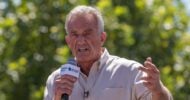Coronavirus has essentially altered life for the foreseeable future, and it’s clear to experts this public health crisis will only be defeated with development and implementation of a vaccine. While Coronavirus has shown us what life is can be without ONE vaccine, there is still the issue of acceptance of vaccines we already have. The resurgence of whooping cough this decade, the 2014 California measles outbreak and ~1200 cases of measles across 31 states last year have forced legislatures across the country to wrestle with how to best protect the public against vaccine-preventable disease. Several, like my home state of New York, as well as California, West Virginia, Mississippi passed regulations requiring children who attend school either be vaccinated or have a legitimate medical exemption precluding immunization. Massachusetts was actively debating a bill on eliminating religious exemptions. A similar measure recently failed in New Jersey, and a law passed in Maine only remained intact after a statewide referendum last week.
As the pandemic progresses, the anti-vaccine movement has appeared even more marginalized. These groups have made the oft-debunked comparison of COVID-19 to influenza and promoted government conspiracy theories linked to the implementation of 5G wireless networks. While this should force legislators to be even more suspect of these groups’ views, state representatives are still highly wary of the ability of anti-vaxxers to formally organize and cause disruption.
Supporting bills to remove philosophical and religious exemptions from vaccination can be a politically difficult choice. As a pediatrician who so often works with parents and legislators, there is always pause in narrowing exemptions from a state mandate. In the case of immunization regulations, state officials are often bombarded by phone calls, emails and visits from a well-coordinated, well-funded, small “anti-vax” faction convinced these rules to erode parental authority (at best) and violate constitutionally protected rights as part of a national conspiracy (at worst).
Pediatricians and legislators are wrongly portrayed by these groups as profiteering handmaids of the pharmaceutical industry. Legislative offices are protested. Children’s hospitals and pediatric offices are protested, picketed, attacked on social media, and unfairly reviewed on sites such as Google and Yelp in the hopes this theater will intimidate lawmakers into maintaining exemptions. Town Halls are disrupted.
However, as a lead advocate of this law and president of one chapter of the American Academy of Pediatrics in New York, it is important for lawmakers voting on these bills in legislatures across the country to consider the following:
Laws that only allow medical exemptions are universally supported by all expert medical organizations. In New York, over 31 major scientific and public health groups supported the law because they understood it would increase vaccination rates and prevent disease. Even medical groups who do not routinely immunize patients, like surgeons – and non-physician healthcare providers, like nurse midwives, strongly advocated for this law as a means of protecting those who could not be vaccinated – such as teachers and children with cancer and other immune conditions.
Despite the illusion of widespread opposition to these measures, eliminating philosophical and medical exemptions is supported by parents, teachers, superintendents, and parent-teacher associations. A New York poll last June, taken at the height of anti-vaccine protests in state and local offices, showed 87 percent of voters supported allowing only legitimate medical exemptions from vaccination as a condition of school attendance. At that time, over 175 schools in our state had student vaccination rates below the levels required to protect them from a vaccine-preventable disease. Maine’s referendum passed with over 70 percent of the vote.
Anti-vaxxers are organized, well-coordinated, and thus able to create an outsize amount of furor and noise about all types of public health bills. They pack meetings in matching outfits, shout down those who disagree with their fringe views, and create artificial drama. Legislators must remember that anti-vax parents represent an extremely small minority of school-age children. In New York State, only 0.9 percent of children in school held religious vaccine exemptions. The expectation is this number will be even lower once state data is available.
Most voters, parents, teachers, and physicians understand the impact of this small number of parents who electively refuse to vaccinate their children is small compared to the ~10,000 children in our state who currently have, or are survivors of, pediatric cancer. This also doesn’t include the 1:100 children who obtain immunization against measles but aren’t fully protected, the thousands of other children receiving immune-modulating treatment for intestinal, rheumatologic conditions, or kids with organ transplants – all of whom cannot be immunized. Legislators must prioritize their welfare and support.
Vaccines are safe and effective. They are the most thoroughly tested medicines administered across all fields of medical practice. They are more tested than insulin preparations for diabetes and asthma medications. As lawmakers in other states review these measures, their decision to support these bills becomes a referendum on their belief in facts, physicians, and public health. Supporting HB 3999 is a referendum on the validity of science in a world governed too often by Twitter propaganda and Facebook falsehoods.
The first priority of any legislature is to ensure the safety of their constituents. Parents have an essential right to believe their children will not contract a preventable disease in school. After all, the passion and rhetoric are filtered out, strengthening vaccination rules are a reflection of our most fundamental responsibly.
Shetal Shah is a neonatologist.
Image credit: Shutterstock.com


















![Rest is a holy practice: Reclaiming the soul of medicine [PODCAST]](https://kevinmd.com/wp-content/uploads/Design-1-1-190x100.jpg)

![Sabbaticals provide a critical lifeline for sustainable medical careers [PODCAST]](https://kevinmd.com/wp-content/uploads/The-Podcast-by-KevinMD-WideScreen-3000-px-3-190x100.jpg)

